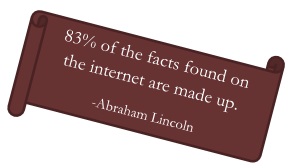December 13, 2016
Your audience loves quotes and quips. They appreciate the valid statistic that backs up your point. They enjoy when you link a story to a fact. They trust you to give them reliable information. Use this trust wisely. Protect your credibility. 
Few people will take the time to check your facts, but it only takes one person finding one mistake to make you look like a fool. Misquoting is the same as lying. Once you have been labelled a liar, you will no longer be taken seriously, and it will invalidate your entire presentation.
Similarly, not crediting the source is the same as lying. If someone recognizes your words as someone else’s, they will not pay attention to the rest of what you have to say. Why bother listening to you when you are taking credit for something that is not yours?
Do your fact checking thoroughly. Always credit your source, even if you are only using their basic concept or a couple of their words. Cross-check your sources. Just because it is on the internet does not mean it is true. If you cannot find a minimum of three trustworthy corroborating sources, then it is not verifiably true. Let it go. Find another fact or story. Better yet, use your own experience!
Mark Twain did not say everything folks credit him with. Every inspirational quote did not come from George Washington or Steve Jobs. Even if widely accepted on Facebook, memes are not fact. Do your homework.
Here is one more point to consider: if you have heard it a thousand times, your audience has heard it a thousand and one. Give them something new!
